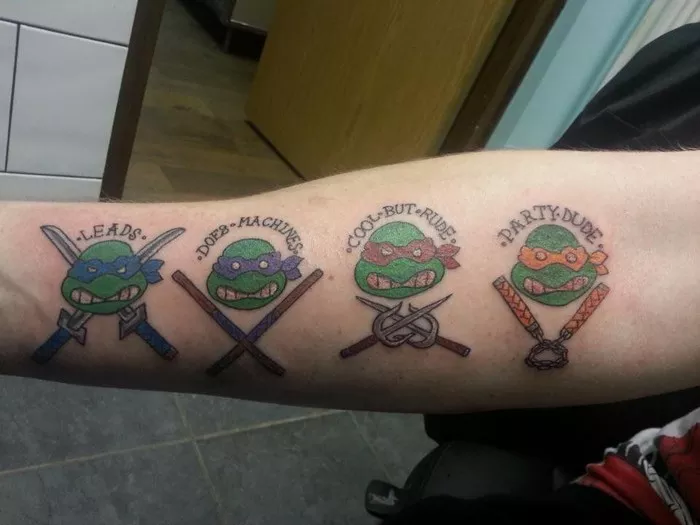In the vast and diverse tapestry of tattoo culture, certain symbols emerge as perennial favorites, reflecting the collective consciousness of societies across the globe. From ancient tribal markings to modern pop culture icons, tattoos serve as timeless expressions of identity, beliefs, and personal narratives. In this comprehensive exploration, we delve into the enigmatic world of tattooing to uncover the most popular motifs that adorn the skin of millions worldwide.
The Evolution of Tattoo Trends: From Tradition to Innovation
Tattooing, an ancient art form dating back thousands of years, has witnessed a remarkable evolution in its symbolism and technique. Traditional tattoos, rooted in cultural practices and rites of passage, often feature motifs like anchors, skulls, and nautical themes. These symbols, imbued with deep significance, continue to hold sway in contemporary tattoo culture, appealing to those drawn to the rich tapestry of history and tradition.
However, the advent of modern tattooing techniques and the influence of popular culture have ushered in a new era of innovation and diversity. From intricate geometric patterns to minimalist designs, the boundaries of tattoo artistry are continually pushed, offering individuals a myriad of options to express their unique identities.
The Rise of Pop Culture Icons: From Film to Fantasy
In an age dominated by mass media and digital entertainment, it comes as no surprise that pop culture icons wield considerable influence in the realm of tattooing. Characters from beloved films, television series, and literary works often find themselves immortalized in ink, serving as enduring symbols of fandom and nostalgia.
From the iconic silhouette of Darth Vader to the whimsical charm of Pokémon creatures, pop culture tattoos offer enthusiasts a tangible connection to the fictional worlds they hold dear. The ubiquity of these symbols speaks to the power of storytelling in shaping our collective imagination, transcending boundaries of age, nationality, and creed.
Symbolism and Significance: Exploring the Meaning Behind the Ink
At the heart of every tattoo lies a story, a narrative woven into the fabric of one’s being. Whether a simple word or a complex illustration, each design carries layers of symbolism and personal significance for its bearer.
Symbols of strength and resilience, such as the mighty lion or the majestic phoenix, resonate with those who have overcome adversity and emerged victorious. Similarly, motifs inspired by nature—like blooming flowers or soaring birds—speak to themes of growth, renewal, and the interconnectedness of all living things.
Religious and spiritual symbols, ranging from the cross to the lotus flower, serve as potent reminders of faith and devotion, offering solace and guidance in times of uncertainty. For many, these tattoos represent a tangible expression of their beliefs and values, forging a profound connection to something greater than themselves.
Tattoo Trends Across Cultures: A Global Perspective
While certain symbols may enjoy widespread popularity, the world of tattooing is as diverse as the cultures that inhabit it. From the intricate patterns of Polynesian tribal tattoos to the delicate motifs of Japanese irezumi, each culture brings its own unique aesthetic and symbolism to the art form.
In the Maori tradition of New Zealand, tattoos known as moko serve as sacred markings of identity and lineage, tracing ancestral connections and tribal affiliations. Similarly, the vibrant hues and symbolic imagery of Indian mehndi tattoos celebrate the joyous occasions of weddings and festivals, adorning the skin with intricate patterns of beauty and auspiciousness.
In recent years, cultural exchange and globalization have led to a blending of tattoo traditions, giving rise to hybrid styles that draw inspiration from multiple sources. This cross-pollination of ideas fosters creativity and innovation, enriching the tapestry of tattoo culture with diverse influences and perspectives.
The Influence of Social Media: Shaping Trends in Tattoo Culture
In an age defined by digital connectivity and social networking, platforms like Instagram and Pinterest have emerged as influential hubs for tattoo enthusiasts and artists alike. Through hashtags and photo sharing, individuals can discover a wealth of inspiration, from avant-garde designs to time-honored classics.
Social media also serves as a powerful tool for tattoo artists to showcase their work and connect with potential clients. By curating an online portfolio and engaging with followers, artists can cultivate a loyal fan base and attract clients seeking their unique style and expertise.
Moreover, the democratization of information afforded by the internet has empowered individuals to research tattoo trends and techniques, allowing them to make informed decisions about their ink. From choosing the right artist to selecting the perfect design, social media has revolutionized the way people approach the tattooing process, fostering a culture of collaboration and community.
The Future of Tattoo Culture: Embracing Diversity and Individuality
As we peer into the future of tattoo culture, one thing is abundantly clear: diversity reigns supreme. In an increasingly interconnected world, the boundaries between cultures, styles, and artistic traditions continue to blur, giving rise to a vibrant tapestry of expression and creativity.
From traditional motifs steeped in history to cutting-edge designs inspired by the digital age, the world of tattooing is as boundless as the human imagination. As society evolves and attitudes toward body art continue to shift, tattoos will undoubtedly remain a powerful means of self-expression, reflecting the ever-changing landscape of identity and belonging.
In the end, whether adorned with a timeless symbol or a contemporary masterpiece, a tattoo serves as a testament to the indomitable spirit of the human experience—a canvas upon which we inscribe our hopes, dreams, and aspirations for generations to come.

